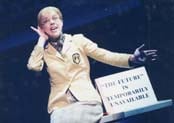OPERA SEARCH

Moscow Cheryomushki (chamber orchestra version)
(Moskau Tscherjomuschki (reduzierte Fassung)) (1957-58, arr. 2001)Libretto by Vladimir Mass and Mikhail Chervinsky; English version by David Pountney with performances under the title 'Paradise, Moscow' (R,E)
Major roles: 2S,M,T,3Bar,B,singing actress and actor-Minor roles: 4S,3M,2T,2B; chorus; ballet
2(II=picc).0.2(II=Ebcl).2sax.0-0.2.1.1-perc(2)-gtr-banjo-ukelele-strings(4.4.0.3.2)
Abbreviations (PDF)
VAAP
Grand Theatre, Leeds
David Pountney, director
Company: Opera North
1950s, the Cheryomushki housing estate in Moscow
The time is the late 1950s and new high-rise housing estates are appearing on the outskirts of Moscow, including one called Cheryomushki (‘Cherry-trees’). A motley group of friends and acquaintances are desperate to be re-housed in the smart new apartment blocks. There are the newly-weds Sasha and Masha Bubentsov, who are currently living in separate dormitories as they cannot find a home together. There is old Baburov, who is ambivalent about leaving his old Moscow haunts, and his bookish daughter Lidochka, who, like Sasha Bubentsov, is a museum guide. There is an explosives engineer, Boris, who soon becomes keen on Lidochka; and Boris’s friend, Sergei, who is a chauffeur for a local government boss. And Sergei’s on-off girlfriend, Lyusya, who is a crane-driver on the Cheryomushki building-site. Unfortunately Sergei’s boss, Drebednyov, is corrupt. Together with the janitor Barabashkin, he is restricting access to the new apartments. Drebednyov has just married a new trophy-wife, the platinum-blonde Vava, and plans to please her by illegally taking two apartments and joining them together to make more luxurious accommodation. As Barabashkin won’t give up the keys, Lyusya uses her crane to lift Boris and Lidochka up to what should be the Baburovs’ new home. While they are there (and getting a little more intimately acquainted), Drebednyov and Barabashkin suddenly burst through a hole in the wall from the next-door flat, and the young people are ejected. Sasha and Masha have managed to get the keys to their new apartment and are hosting a house-warming party. Lyusya arrives and tells them of Drebednyov’s plot to prevent the Baburovs from getting their rightful new home. Horrified, the new Cheryomushki tenants gather together under Lyusya’s leadership and build a magic garden with a truth bench. Anyone who sits on the bench must tell the truth, and Drebednyov, Vava and Barabashkin are exposed and vanquished. The two pairs of lovers, Lyusya and Sergei and Boris and Lidochka, are brought together and everyone lives happily ever after.
All his life Shostakovich had a fondness for light-music, operetta and musicals. In the late 1950s a friend became conductor at the Moscow Operetta Theatre and this gave the composer a chance to try out the genre for himself, working with two leading popular writers of the day.
The result was a highly entertaining satirical romp, mocking the corruption and idealism of the USSR in the post-Stalin era and poking particular fun at Khrushchev’s notoriously overambitious plan to rehouse almost the entire population in hastily built and splendidly up-to-date apartment blocks, complete with fridges, lifts and all mod cons. The plot concerns a group of happy and enthusiastic young Muscovites who look forward to being rehoused in the smart new high-rise estate of Cheryomushki but find that practicalities are a more complicated than they first imagined. Local officials have their own dastardly plans for what they want to do with these new flats and are greedily trying to take bribes or keep the apartments for themselves. Naturally, after some ups and downs, good wins out.
The score bursts with energy and catchy tunes, not to mention some wonderful parodies of perennial favourites like Tchaikovsky’s ‘The Sleeping Beauty’ and Lehar’s ‘The Merry Widow’. In its original it is scored for a large orchestra, handled with tremendous verve and colour. More recently, in modern cut-down versions for chamber ensembles, it has found a new life as a delightful addition to the repertoire for smaller-scale opera companies. In 1962, with some changes to the music and a simplified title, ‘Cheryomushki’, this operetta was turned into an ebulliantly vulgar film, which will appeal to anyone with a taste for mid-20th-century kitsch.
Note by Gerard McBurney
"A fascinating work in which Shostakovich pokes gentle fun at the problems of suburban expansion in the Russian capital. Composed during the Krushchev era, it is full of subversive undercurrents, disguised by the innocence of the music which contains parodies of Offenbach and several Russian composers."
BBC Music Magazine
Comic, Romantic
